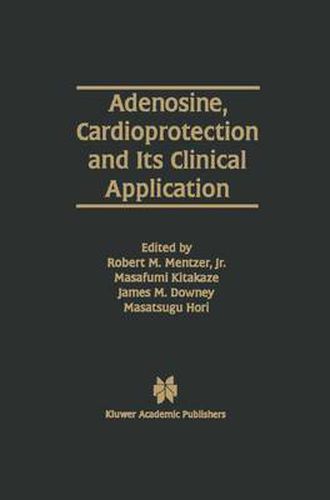Readings Newsletter
Become a Readings Member to make your shopping experience even easier.
Sign in or sign up for free!
You’re not far away from qualifying for FREE standard shipping within Australia
You’ve qualified for FREE standard shipping within Australia
The cart is loading…






This title is printed to order. This book may have been self-published. If so, we cannot guarantee the quality of the content. In the main most books will have gone through the editing process however some may not. We therefore suggest that you be aware of this before ordering this book. If in doubt check either the author or publisher’s details as we are unable to accept any returns unless they are faulty. Please contact us if you have any questions.
It has been almost 15 years since the fIrst reports appeared indicating that adenosine exerted a .protective effect in ischemic and reperfused myocardium. Numerous experimental studies have shown that adenosine (both exogenous and endogenous adenosine) delays the onset of ischemic contracture, modulates myocardial metabolism during ischemia, attenuates reversible postischemic ventricular dysfunction (myocardial stunning), and reduces myocardial infarct size. Initial studies on adenosine’s cardioprotective effect were based on its ability to stimulate postischemic ATP resynthesis, increase coronary blood flow, and reduce heart rate. Although these actions of adenosine are undoubtedly benefIcial to the ischemic/reperfused heart, it now appears that adenosine’s cardioprotective effect may be exclusive of these properties. The immense growth in the number of articles on adenosine cardioprotection in the last several years has been related in large part to the hypothesis that adenosine plays a role in ischemic preconditioning. Ischemic preconditioning is the phenomenon in which a brief period of ischemia (and reperfusion) prior to a more prolonged occlusion reduces myocardial infarct size. This form of myocardial protection has received much interest because ischemic preconditioning has been shown to be the most potent means of reducing infarct size in all animal models thus far tested. In fact prior to studies implicating adenosine’s role in ischemic preconditioning, adenosine’s infarct reducing effect was not well recognized.
$9.00 standard shipping within Australia
FREE standard shipping within Australia for orders over $100.00
Express & International shipping calculated at checkout
This title is printed to order. This book may have been self-published. If so, we cannot guarantee the quality of the content. In the main most books will have gone through the editing process however some may not. We therefore suggest that you be aware of this before ordering this book. If in doubt check either the author or publisher’s details as we are unable to accept any returns unless they are faulty. Please contact us if you have any questions.
It has been almost 15 years since the fIrst reports appeared indicating that adenosine exerted a .protective effect in ischemic and reperfused myocardium. Numerous experimental studies have shown that adenosine (both exogenous and endogenous adenosine) delays the onset of ischemic contracture, modulates myocardial metabolism during ischemia, attenuates reversible postischemic ventricular dysfunction (myocardial stunning), and reduces myocardial infarct size. Initial studies on adenosine’s cardioprotective effect were based on its ability to stimulate postischemic ATP resynthesis, increase coronary blood flow, and reduce heart rate. Although these actions of adenosine are undoubtedly benefIcial to the ischemic/reperfused heart, it now appears that adenosine’s cardioprotective effect may be exclusive of these properties. The immense growth in the number of articles on adenosine cardioprotection in the last several years has been related in large part to the hypothesis that adenosine plays a role in ischemic preconditioning. Ischemic preconditioning is the phenomenon in which a brief period of ischemia (and reperfusion) prior to a more prolonged occlusion reduces myocardial infarct size. This form of myocardial protection has received much interest because ischemic preconditioning has been shown to be the most potent means of reducing infarct size in all animal models thus far tested. In fact prior to studies implicating adenosine’s role in ischemic preconditioning, adenosine’s infarct reducing effect was not well recognized.